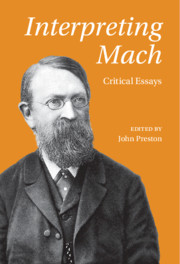Book contents
- Interpreting Mach
- Interpreting Mach
- Copyright page
- Dedication
- Contents
- Figures
- Tables
- Contributors
- Introduction
- 1 Ernst Mach’s Piano and the Making of a Psychophysical Imaginarium
- 2 Mother’s Milk and More
- 3 Meaningful Work
- 4 Mach on Analogy in Science
- 5 Ernst Mach’s Enlightenment Pragmatism
- 6 On the Philosophical and Scientific Relationship between Ernst Mach and William James
- 7 Ernst Mach and Friedrich Nietzsche
- 8 Abstraction, Pragmatism, and History in Mach’s Economy of Science
- 9 Holding the Hand of History
- 10 Ernst Mach and the Vienna Circle
- 11 Narratives Divided
- 12 Phenomenalism, or Neutral Monism, in Mach’s Analysis of Sensations?
- 13 The Case for Mach’s Neutral Monism
- Index
- References
5 - Ernst Mach’s Enlightenment Pragmatism
History and Economy in Scientific Cognition
Published online by Cambridge University Press: 05 March 2021
- Interpreting Mach
- Interpreting Mach
- Copyright page
- Dedication
- Contents
- Figures
- Tables
- Contributors
- Introduction
- 1 Ernst Mach’s Piano and the Making of a Psychophysical Imaginarium
- 2 Mother’s Milk and More
- 3 Meaningful Work
- 4 Mach on Analogy in Science
- 5 Ernst Mach’s Enlightenment Pragmatism
- 6 On the Philosophical and Scientific Relationship between Ernst Mach and William James
- 7 Ernst Mach and Friedrich Nietzsche
- 8 Abstraction, Pragmatism, and History in Mach’s Economy of Science
- 9 Holding the Hand of History
- 10 Ernst Mach and the Vienna Circle
- 11 Narratives Divided
- 12 Phenomenalism, or Neutral Monism, in Mach’s Analysis of Sensations?
- 13 The Case for Mach’s Neutral Monism
- Index
- References
Summary
This chapter explores Ernst Mach’s philosophy of scientific knowledge as an original form of pragmatism. Mach recognised science as a deeply historical phenomenon and scientific knowledge as path-dependent, thoroughly fallible, and far from ever closed. Conceptual perplexities, he held, can only be resolved by historical-comparative investigations. What merits thinking of Mach as a pragmatist, I will argue, is his insistence, as a philosopher, on the ultimately practical orientation of all thought as a matter both of fact and norm, and, as a historian of science, on the need to investigate the specific problem situations out of and in response to which concepts and theories developed. Last but not least, the practical orientation of his philosophy found expression in his allegiance to the ideal of enlightenment.
- Type
- Chapter
- Information
- Interpreting MachCritical Essays, pp. 84 - 102Publisher: Cambridge University PressPrint publication year: 2021
References
- 4
- Cited by

